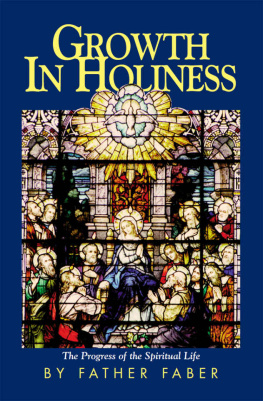Rev. Fr. Frederick Faber - Growth In Holiness
Here you can read online Rev. Fr. Frederick Faber - Growth In Holiness full text of the book (entire story) in english for free. Download pdf and epub, get meaning, cover and reviews about this ebook. year: 2015, publisher: TAN Books, genre: Religion. Description of the work, (preface) as well as reviews are available. Best literature library LitArk.com created for fans of good reading and offers a wide selection of genres:
Romance novel
Science fiction
Adventure
Detective
Science
History
Home and family
Prose
Art
Politics
Computer
Non-fiction
Religion
Business
Children
Humor
Choose a favorite category and find really read worthwhile books. Enjoy immersion in the world of imagination, feel the emotions of the characters or learn something new for yourself, make an fascinating discovery.
- Book:Growth In Holiness
- Author:
- Publisher:TAN Books
- Genre:
- Year:2015
- Rating:3 / 5
- Favourites:Add to favourites
- Your mark:
- 60
- 1
- 2
- 3
- 4
- 5
Growth In Holiness: summary, description and annotation
We offer to read an annotation, description, summary or preface (depends on what the author of the book "Growth In Holiness" wrote himself). If you haven't found the necessary information about the book — write in the comments, we will try to find it.
Rev. Fr. Frederick Faber: author's other books
Who wrote Growth In Holiness? Find out the surname, the name of the author of the book and a list of all author's works by series.
Growth In Holiness — read online for free the complete book (whole text) full work
Below is the text of the book, divided by pages. System saving the place of the last page read, allows you to conveniently read the book "Growth In Holiness" online for free, without having to search again every time where you left off. Put a bookmark, and you can go to the page where you finished reading at any time.
Font size:
Interval:
Bookmark:
Growth in Holiness
or
The Progress of the Spiritual Life
Frederick William Faber, D.D.
WITH THE APPROBATION OF THE
MOST REV. ARCHBISHOP OF BALTIMORE
An edition of this book was first published in 1855.
This present edition was retypeset from the 15th American edition published by John Murphy & Co., 182 Baltimore Street, Baltimore, in approximately 1890.
The type in this book is the property of TAN Books and may not be reproduced, in whole or in part, without written permission of the publisher.
Library of Congress Catalog Card Number: 90-70233
TAN Books
Charlotte, North Carolina
www.TANBooks.com
2012
TO
MY BLESSED PRINCE AND PATRON,
SAINT RAPHAEL,
ONE OF THE SEVEN WHO STAND ALWAYS BEFORE GOD,
GLORIOUS, BENIGNANT, BEAUTIFUL,
THE FIGURE OF HIS PROVIDENCE,
PHYSICIAN, GUIDE AND JOY OF SOULS,
COMPANION OF WAYFARING MORTALS,
AND ANGEL OF THEIR VICISSITUDES,
BY WHOM
THE TENDERNESS OF THE FATHER, THE HEALING OF THE SON,
AND THE GLADNESS OF THE HOLY GHOST
ARE MINISTERED TO WANDERING MEN
WITH THE EFFICACIOUS POWER OF AN ANGELIC SPIRIT
AND THE COMPASSIONATE, PATHETIC LOVE
OF A KINDLY HUMAN HEART.
THE ORATORY, LONDON,FEAST OF ST. RAPHAEL
1855
CONTENTS
Prefatory Epistle
TO THE
REV. WILLIAM ANTONY HUTCHISON,
PRIEST OF THE LONDON ORATORY
My dear Father Antony,
In a walk by the seashore at Lancing four years ago, I gave some reasons why I should not publish anything on the spiritual life until a given date. That date is past, and here is my book. I have little to say in the way of preface, and that little shall be in the shape of a letter to you, because it will be a memento of our mutual affection which will give both of us pleasure; for it will recall the eventful nine years which we have now spent together, and which it has pleased God should be equal to a long life for their various trials and almost romantic vicissitudes.
There are two objects for which books may be written, and which must materially affect their style. One is to produce a certain impression on the reader while he reads: the other, to put before him things to remember, and in such a way as he will best remember them. The present work is written for the latter object, and consequently with as much brevity as clearness would allow, and as much compression as the breadth of the subject and its peculiar liability to be misunderstood, would safely permit.
I dare not presume that there will not be many contradictions to so large a volume, in which every sentence, and frequently each clause of a sentence, is a judgment on matters about which all pious Catholics have a more or less formed opinion. But so generous a measure of indulgence has been dealt to me before, that I cannot persuade myself it will now be altogether withdrawn, especially as the book will not be found to contain one intentional word or unfavorable criticism either of men or things. This is my only boast. For the rest, I have done no more than try to harmonize the ancient and modern spirituality of the Church, with somewhat perhaps of a propension to the first, and to put it before English Catholics in an English shape, translated into native thought and feeling, as well as language.
Much of the material of the book has fully observed the Horatian precept of Nonum prematur in annum , and the rest has been nine years growing. But it is a very easy thing for a man to go wrong in spiritual theology, and to stray into the shadow of condemned propositions. It will not therefore be conceitedly making much of a little thing if I say that I retract beforehand in the amplest and most unqualified manner anything, whether of thought or of expression, which may be uncongenial, not only to the decisions of the Holy See, but also to the approved teaching of our religious orders and theological schools. May God be with my work where it speaks the mind of His Church without exaggeration and with sincerity!
Ever, my dear Father Antony,Affectionately yours,
FRED. W. FABER
The Oratory, London
Feast of St. Hugh, 1854"Quin etiam juniores, quanquam theologicis literis imbuti, talem debent reverentiam senioribus iis, quibus vita cum scientia concordat, ut vix propter aliquas novas suasiones quantumcumque apparentes pertinax unquam feratur cito contra determinationes eorundem assertio. Virtus quippe, qualem habebant genitam ex multis experientiis, long certis arte judicat et operatur.
"Per paucam instructionem intellectus, in scientiis praesertim divinis, causantur nonnunquam errores in eis, qui se totos devotioni tradiderunt, dum voluerunt plus sapere, quam sibi satis erat."
GERSON
"Consultius nihil fieri a nobis potest quam ut nostras semper opiniones et voluntates, linguas pennasque aptemus ei disciplinae, que in universali viget Ecclesia eo aevo, quo nos summi providentia numinis collocavit."
THOMASSINUS
"Noli eos imitari, qui nullum legendi ordinem servant; sed quod forte occurrerit, quodque casu repererint, legere gaudent: quibus nihil sapit, nisi quod novum est, et inauditum. Consulta enim, et vetera omnia, quantum libet utilir, fastidiunt. Tanta instabilitas procul a te cit: ipsa enim non promovet, sed dispergit spiritum; et periculose laborat, qui hoc morbo vitiatus est."
DACRIANUS
Chapter I
TRUE SIGNS OF PROGRESS IN THE SPIRITUAL LIFE
The spiritual life is made up of contradictions. This is only another way of saying that human nature is fallen. One of the greatest contradictions, and practically one of the most difficult to be managed, is that in spirituality it is very important we should know a great deal about ourselves, and at the same time equally important that we should think very little about ourselves; and it is not easy to reconcile these things. I mention this difficulty at the outset, inasmuch as we shall have in the course of this treatise to look very much into ourselves, and consequently we run the risk at the same time of thinking very much of ourselves; and this last might do us more harm than the first would do us good.
No knowledge in the world can be more interesting to us than to know how we stand with God. Everything depends upon it. It is the science of sciences to us, more than the knowledge of good and evil which tempted Adam and Eve so violently. If we are well with God, all is well with us, though the thickest darkness of adversity be round about. If we are not well with Him, nothing is well with us, though the best and brightest of earth be at our feet. It is natural that we should desire to know if we are making progress in the spiritual life; neither is there anything wrong, or even imperfect, in the desire, provided it be not inordinate. It would be an immense consolation to us if we should have reason to suppose we were advancing; and if, on the contrary, we had grounds for suspecting something was amiss, there would at least be a sense of safety and security in the feeling that at all events we were not going on in the dark about the matter which concerns us more nearly and dearly than anything else. Love likes to know that it is accepted and reciprocated; and in the case of God especially, that it is not rejected as it deserves to be; and fear is equally anxious for the same knowledge because of the eternal interests which are concerned in it.
But however much we may desire it, we cannot have anything like an accurate knowledge of our progress in the spiritual life; and that for reasons on God's side as well as on our own. On His side, because it is His way to conceal His work; and on ours, because self-love exaggerates the little good we do. We do not even know for certain whether we are in a state of grace, or as Scripture expresses it, whether we deserve love or hatred. For we have each of us a cavern of secret sins about us; and as the Inspired Writer warns us, we must not be without fear even of forgiven sin.
Next pageFont size:
Interval:
Bookmark:
Similar books «Growth In Holiness»
Look at similar books to Growth In Holiness. We have selected literature similar in name and meaning in the hope of providing readers with more options to find new, interesting, not yet read works.
Discussion, reviews of the book Growth In Holiness and just readers' own opinions. Leave your comments, write what you think about the work, its meaning or the main characters. Specify what exactly you liked and what you didn't like, and why you think so.











